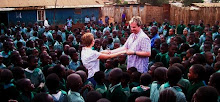“Christ has no body on earth but yours,
no hands but yours,
no feet but yours.
Yours are the eyes through which
Christ’s compassion for the world is to look out;
Your are the feet with which He is to go about doing good;
And yours are the hands with which He is to bless us now.” (p. 13)
no hands but yours,
no feet but yours.
Yours are the eyes through which
Christ’s compassion for the world is to look out;
Your are the feet with which He is to go about doing good;
And yours are the hands with which He is to bless us now.” (p. 13)
~SAINT TERESA OF AVILA
Richard Stearns notes that Christianity is meant to be spread ~ not through coercion or dictation ~ but through demonstration. Our job is to share the Gospel in ways that others can see, feel, and hear God’s love in tangible ways. It is God’s job to work in people’s hearts to lead them to redemption (p. 18). To use one of my favorite explanations: we are seed planters; God brings about the harvest. We may never be privileged to meet Roshni face-to-face; yet, Roshni knows we love her and care about her well being by the things our monetary support provides for her, coupled with the personal letters (even emails now!) that are translated into her language, and then given to she and her family. I LOVE THAT!
“The true gospel is a call to self-denial. It is not a call to self-fulfillment” (p. 25).
~JOHN MACARTHUR
~JOHN MACARTHUR
Remember the story referred to as “The Rich young Ruler” found in Matthew 19? He asks what he must do to get eternal life. Jesus goes on to list things like “do not murder, do not commit adultery, do not steal, do not give false testimony, honor your father and mother, and love your neighbor as yourself.” He feels pretty good about where he stands with those commands! Strangely the man asks what else he lacks? I believe I would have stopped with the previous answer! So, Jesus then instructs the rich young ruler to sell everything he had and give to the poor, and then promised that he would have a treasure in heaven. Then Jesus tells him he is to follow Him. He asked; Jesus told! And the young man wished he had never asked in the first place. The man appeared to be doing all the right things on the outside, but the condition of his heart was not good. His “stuff” meant more to him that his God did. Jesus does not want “part” or “most” of our life; He wants unconditional surrender, no strings attached or conditions placed upon Him (p. 37-39). Here’s something to think about: do you control your possessions OR do your possessions control you?
“The poverty of our century is unlike that of any other. It is not, as poverty was before, the result of natural scarcity, but of a set of priorities imposed upon the rest of the world by the rich. Consequently, the modern poor are not pitied… But written off as trash. The twentieth-century consumer economy has produced the first culture for which a beggar is a reminder of nothing.” (p. 95)
~JOHN BERGER
~JOHN BERGER
President Jimmy Carter received the Nobel Peace Prize for fighting poverty and disease. After visiting 200 countries, meeting heads of states, and evaluating the chasm that exists between the world’s richest and poorest, he said this:
“…..Citizens of the ten wealthiest countries are now seventy-five times richer than those who live in the ten poorest ones, and the separation is increasing every year, not only between nations but also within them. The results of this disparity are root causes of most of the world’s unresolved problems, including starvation, illiteracy, environmental degradation, violent conflict, and unnecessary illness that range from Guinea worm to HIV/AIDS” ( p. 98).
This speech was given in 2002. Note that, in addressing the greatest challenge the world faces, President Carter did not say 9/11, global warming, HIV/AIDS, global terrorism, ethnic or religious differences, hunger, disease or illiteracy. He stated that it was the “disparity between the rich and the poor”. So do we just accept that it is what it is, and continue down the same paths ~ greedy, selfish, “it’s all about me” mentality ~ OR do we choose to implement changes ~ do we deliberately and willfully choose to follow Jesus’ command to “love your neighbor as yourself” ? (Mark 12: 30-31)
There has always been a debate over who my/your “neighbor” is; there are as many opinions as they are people. However, opinions are just that! Based on man’s interpretation, prejudices, likes and dislikes…when truly our “neighbor” is whoever Jesus says it is. What does Scripture say about the “who” of our neighbor? There is the story of the “Good Samaritan” in Luke 10. Two religious leaders passed the beaten man by, doing absolutely nothing! It was a Samaritan (considered “half breeds” – p. 100) who helped the man! In replying to the question posed to Jesus “who is my neighbor”, He turned the question around on them, and asked which one of the 3 people in the story was a neighbor. Of course, their response was the Samaritan. Then Jesus boldly commanded each of them: “Go and do likewise” (v. 37).
Stearns states: “According to President Carter (the disparity between rich and poor nations) didn’t even exist before 1800. According to Jeffrey D. Sachs, in 1820 the difference in per capita income between the wealthiest region of the world and the poorest was perhaps four to one. Compare that to the 75 to 1 cited by President Carter in 2002. Prior to 1800, disease and inadequate health care were facts of life that affected all people. Lack of clean water and sanitation would have been virtually universal….Illiteracy was common everywhere…perhaps the exception to this was the thousands of missionaries who traveled to other nations to reach out to their neighbors….But for the general public, 3 major impediments stood in the way of anyone wanting to love their distant neighbors, even into the mid-twentieth century: awareness, access, and ability” (pp. 100-101).
Guess what? With the age of the internet, awareness is no excuse anymore. We hear on the radio/TV/internet; we see on the TV/internet/magazines/newpapers. We have the awareness!
Access can no longer be a legitimate reason to do nothing about the poverty around the world. We can be on the other side of the planet in fewer than 24-hours (p. 102). Access is readily available!
“But I don’t have the ability or gifts to do things like this, especially on foreign soil!” God does not need your ability; He simply wants your availability! He used everyday, ordinary, sinful creatures just like us to heal the sick, raise the dead, feed the hungry and provide for the poor! Fishermen…murderers…harlots…children…We all have the ability; we may lack in willingness but we have the ability!
“Here is the bottom line: if we are aware of the suffering of our distant
neighbors – and we are – if we have access to these neighbors, either
personally or through aid organizations and charities – and we do – and
if we have the ability to make a difference through programs and technologies
that work – which is also the case – then we should no more turn our backs
on these neighbors of ours than the priest and the Levite should have
walked by a bleeding man” (p. 104).
neighbors – and we are – if we have access to these neighbors, either
personally or through aid organizations and charities – and we do – and
if we have the ability to make a difference through programs and technologies
that work – which is also the case – then we should no more turn our backs
on these neighbors of ours than the priest and the Levite should have
walked by a bleeding man” (p. 104).
Let’s read on (p. 104): “Fifteen thousand Africans are dying each day of preventable, treatable diseases – AIDS, malaria, TB—for lack of drugs that we take for granted. This statistic alone makes a food of the idea many of us hold on to very tightly: the idea of equality. What is happening to Africa mocks our pieties, doubts our concern and q2uestions our commitment to the whole concept. Because if we’re honest, there’s no way we could conclude that such mass death day after day would ever be allowed to happen anywhere else. Certainly not North America or Europe, or Japan. An entire continent bursting into flames? Deep down, if we really accept that their lives – African lives – are equal to ours, we would all be doing more to put the fire out. It’s an uncomfortable truth” (p. 104). Know who said that? BONO! Not some big time church leader, but a rock star, who has fought for the causes of the poor for the last 25-years. I close today with more words from Bono:
“We can be the generation that no longer accepts than an accident of latitude determines whether a child lives or dies – but will we be that generation? Will we in the West realize our potential or will we sleep in the comfort of our affluence with apathy and indifference murmuring softly in our ears? Fifteen thousand people dying needlessly every day from AIDS, TB and malaria. Mothers, fathers, teachers, farmers, nurses, mechanics, children. This is African’s crisis. That it’s not on the nightly news, that we do not treat this as an emergency – that’s our crisis. Future generations flipping through these pages will know whether we answered the key question. The evidence will be the world around them. History will be our judge, but what’s written is up to us. We can’t say our generation didn’t know how to do it. We can’t say our generation couldn’t afford it. And we can’t say our generation didn’t have reason to do it. It’s up to us” (p. 105)
Remember Roshni from yesterday! Please continue praying for her! Stay tuned tomorrow for Part 3.
I must leave you with this precious photo of Miss Molly, preparing for her dirt bike ride:























No comments:
Post a Comment